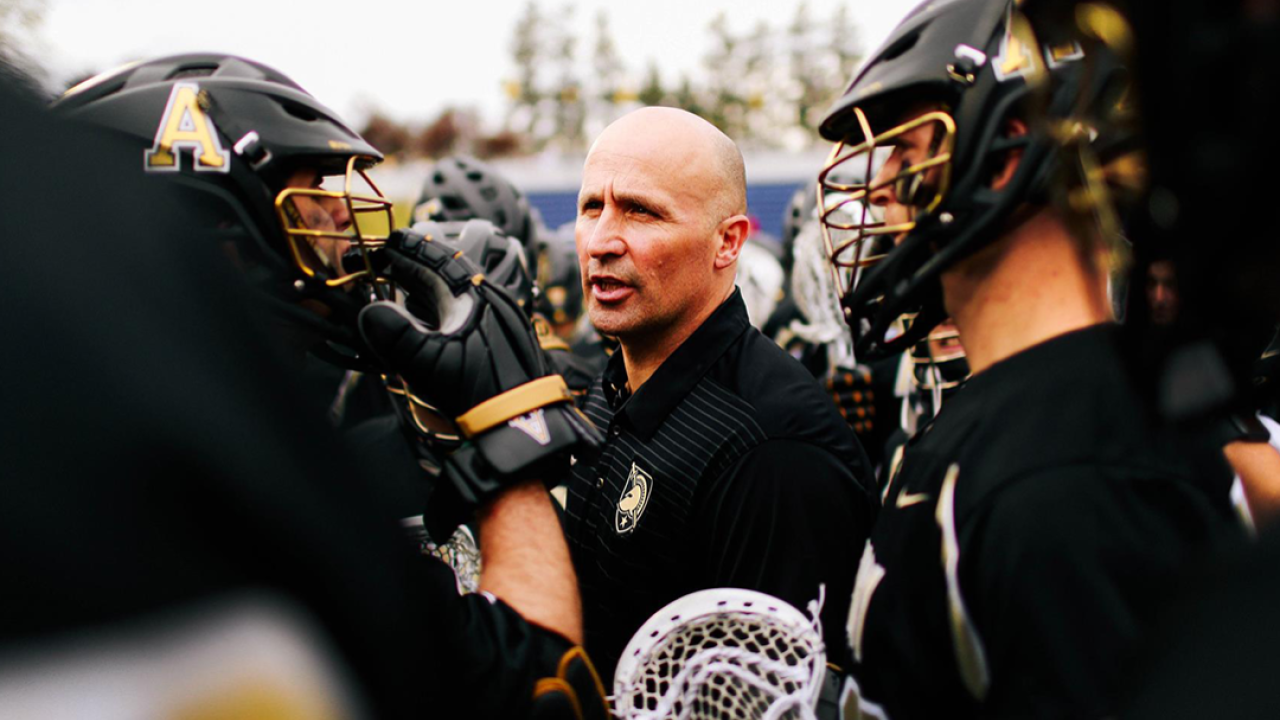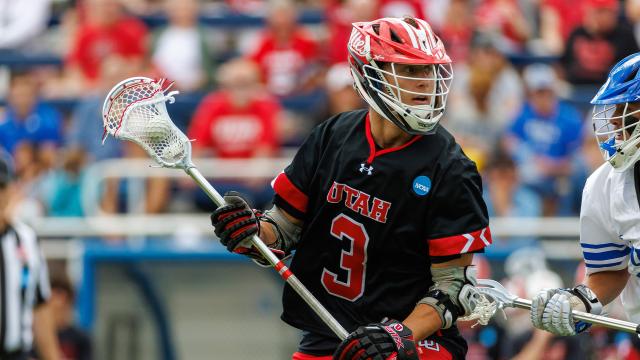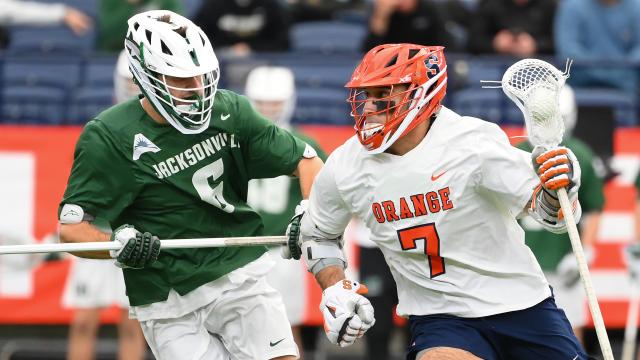
Alberici Family Values: 'Be a Tough Guy in Life'
Army defeated defending NCAA champion Maryland in the first round of the NCAA tournament Saturday to advance to the quarterfinals for the first time since 2010.
With the Black Knights set to play Penn State at Navy, of all places, we revisit this 2019 magazine feature on coach, father and leader Joe Alberici.
JOE ALBERICI STARTED GIVING A VERSION OF THE SPEECH that caps off the Army summer boys’ lacrosse camp around eight years ago. He calls it the “Tough Guy Talk.” He’s received more letters and emails in support of the message than he can count. He thinks he’s just saying what the parents are thinking, but with a little more emotion. Some parents have told him they’ve affixed quotes from the talk onto their refrigerators.
Being tough doesn’t entail being the strongest or most skilled. Alberici has a different definition.
“It’s about giving everything you have to everything you do,” he said. “100 percent, 100 percent of the time.”
Alberici divides toughness into three categories: on the lacrosse field, in the classroom and in life. Vital to “being a tough guy in life” is inclusion.
“It’s right to be inclusive,” Alberici told the campers and their parents on July 18th as he paced on the track at Shea Stadium. The Hudson River shimmered in the background.
“Kids that don’t look like you, don’t talk like you, don’t have all the nice things that you do, maybe don’t think as well as you do — don’t exclude them. That doesn’t take any toughness at all.”
A two-minute clip of the talk posted on the Army men’s lacrosse Twitter account received more than 46,000 views.
Special thanks to over 950 campers who attended our Summer Lacrosse Camps over the last two weeks! #BeAToughGuy ! #GotBetter #GoArmy #BeatNavy pic.twitter.com/qytpsXUNxj
— Army Men's Lacrosse (@ArmyWP_MLax) July 18, 2019
A one-minute version from Alberici’s address to younger campers a week earlier had over 124,000.
Between @mPinoe inspiring my daughter to do good to the head coach @ArmyWP_MLax giving one of the beat speeches I’ve heard to a group of 9/10/11 year old campers, it has been a good week for setting the bar high! (This is but a snippet of a speech that was awesome. ) pic.twitter.com/6QoXqmalZr
— Sara Forman (@SaraL4man) July 12, 2019
“The most important message from one of our sport’s best,” then-USA Lacrosse CEO Steve Stenersen replied on Twitter.
“It’s a message that my players get every day they’re with me,” Alberici says while sitting in his office at Michie Stadium on the first day of fall practice in September. “We call it being a West Point man.”
In Alberici’s office, there’s a sign that says “I Play For You.” It features the name of every player in the 102-year history of Army lacrosse. There’s also a lunch box which a cadet carries to every practice and game. Alberici started the tradition in 2008. It symbolizes the blue-collar mentality and toughness he wants to instill.
Family. Toughness. Tradition. Alberici identified these as the Army’s core values. The three words are on the team’s training shirts — and on the wallpaper of Alberici’s iPhone.
“What I failed to say,” Alberici says after he described his surroundings, “is that there’s still more pictures of my family then there is of that stuff.”
Max Alberici attended the Army lacrosse camp this summer, though he probably could have recited his dad’s talk word for word. The range of his memory verges on encyclopedic. The 6-foot-1 sophomore at James I. O’Neill High School in Highland Falls, N.Y., has a course load that includes AP Biology and AP European History. He might know more about the Premier Lacrosse League than, ahem, those who cover it. By the age of 5, he knew all 50 U.S. capitals and state flags. He’s great with numbers.
“Throw out a Division I college right now,” he insists when asked about his knowledge of mascots.
“Hawaii?”
“The Warriors, formerly known as the Rainbow Warriors. Adopted the [name] Rainbow Warriors [again] in 2013.”
“Bowling Green?”
“Falcons.”
OK. One more. “Houston?”
“Cougars,” he answers. “I know that one because Army played them in a bowl game and smacked them.”
“He’s the expert on everything,” says Petra Alberici, Joe’s wife and Max’s mom. “I think when God takes something away, he gives you something else in exchange.”
When Isabella Alberici, 13, was tasked with writing an essay earlier this fall about three qualities her family values, she picked love, communication, and...toughness.
She didn’t have to look far for inspiration.
“My brother was the main point of that essay,” she says. “He shows me every day how to be tough.”
MAXIMUS BRUNO ALBERICI WAS BORN OCT. 13, 2003 at Duke University Medical Center. Eight weeks premature, he was diagnosed with cerebral palsy after more than a month in the neonatal intensive care unit. The condition restricts some of his mobility and coordination.
The Albericis never considered holding their oldest child back from sports. Max’s first recorded steps at the age of 3 were at a West Point practice.
“All the guys on the whole team were around in a line and cheering for him and calling his name,” Petra Alberici says. “It was the greatest thing ever”
When the team gathered at the Albericis’ home on campus a mile and a half from Michie Stadium, Max always thought they were there just to see him. He developed balance by hitting a tee ball or leaning against a hockey stick. He started playing organized lacrosse when he was 7. He found his niche as a goalie and support in the West Point community.
“The quality of people at this place I would put up against any place in the world,” Joe Alberici says.
Max attended elementary and middle school “on post,” but uncertainty arose when he began his freshman year at O’Neill. How would he adjust to a school twice the size? Would he make friends? There’s only varsity lacrosse. Would the coach cut him?
“No, No, No,” O’Neill coach Lew Lattari replies when asked if Max needed any accommodations. “He made the team on his own. There was no question when it came to that.”
Lattari was shocked when Max showed up for the Raiders’ first practice this spring. In January, he underwent surgery to “provide more space” on his Achilles and hamstrings. Max had casts on both legs for a month and a half and required a wheelchair to get around school. He got the casts off a week before practice started.
”This kid was born with two hearts, that’s what I think,” Lattari says.
On the Eagle Scout track, Max spent six days this summer at Camp Ranachqua with Troop 23. Michael Greifenstein, the scoutmaster, watched Max stumble occasionally on the wet, technical terrain. He never asked for help.
“These falls were very rough, and would have easily taken out the faint at heart,” Greifenstein wrote in an endorsement letter. “Not Max. Max is strong and focused. He does not let his condition hold him back, nor does he quit.”
FIFTY-NINE SECONDS REMAINED in the New York Class D Section 9 final when Lattari summoned his freshman goalie. After the buzzer sounded and O’Neill had clinched its third straight sectional title with a 19-11 win over Millbrook, Luke Kilner, the team’s senior midfielder now at Cortland, made a beeline for Alberici and hugged him. The rest of the team followed.
“It’s one of the best feelings I’ll ever remember,” Max says. “To have a kid that’s going to play at the next level, really embrace a freshman like me who shouldn’t be walking, shouldn’t be playing sports, that just meant the world to me.”
In the championship photo, some players are seated. Most are crouched. Max stands tall at the back. His smile stretches from ear to ear and flashes his braces.
“Just look at his face in the picture,” Lattari says. “It made me so happy to see him so happy.”
Max won’t have to rely solely on his memory to remind himself of where toughness can take you. Among the recent renovations at O’Neill is a new trophy case. There’s a new patch on the lacrosse team’s banner in the gym and the players received t-shirts to commemorate the accomplishment. They have a picture of the state of New York along with the words “Section Champs.”
“It holds so much value to me that all my hard work has paid off,” Max says. “Just to be there is an honor and where I always wanted to be. I wanted to be on the lacrosse field.”
Alberici would like to help O’Neill advance past the second round of the state tournament. Beyond that? He already knows.
“I want to coach eventually, like my dad,” he says. “I’d like to come back to West Point. I’d love pick up where my dad left off.”
Nelson Rice
Related Articles




